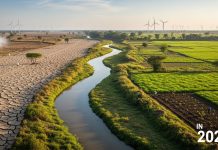The factors contributing to climate change are interconnected and complex. Emissions of greenhouse gases, deforestation, and unsustainable farming practices have led to significant climatic changes, extreme weather events, and the depletion of ecosystems. Raising awareness about climate change and its impacts is important for promoting a culture of sustainability and conservation. In this article, we will discover the key issues related to climate change and discuss how individuals can take action to mitigate its effects.
What is Climate Change?
Climate change refers to long-term alterations in temperature, precipitation, wind patterns, and other elements of the Earth’s climate system. These changes are primarily driven by anthropogenic activities (human-caused or influenced activities that can impact the environment), such as the burning of fossil fuels, deforestation, and industrial development, which significantly impact the environment. According to the Intergovernmental Panel on Climate Change (IPCC), the Earth’s temperature has increased by approximately 1.1 degrees Celsius since the late 1800s. This warming trend is linked to an increase in the intensity and frequency of extreme weather events, rising sea levels, and shifts in ecosystem distribution.
Impact on the Environment
- Biodiversity Loss: Climate change poses a significant threat to many species, leading to habitat destruction, altered migration patterns, and increased risk of extinction. As ecological stability declines, the delicate balance of life on our planet is jeopardized.
- Extreme Weather Events: Rising temperatures contribute to a higher frequency of extreme weather events such as cyclones, droughts, and floods. These natural disasters not only disrupt communities but also inflict severe economic damage, resulting in the loss of livelihoods and essential resources.
- Ocean Acidification: The oceans often absorb excessive carbon dioxide, causing acidification that threatens marine life, particularly coral reefs. These ecosystems are crucial for the survival of countless species and play a vital role in maintaining ocean health.
- Water Scarcity: Changing precipitation patterns impact the availability of fresh water, significantly affecting agricultural and domestic water use. Regions that were once productive may become barren, exacerbating hunger and food insecurity.
What Can We Do?
- Cut Down on Carbon Emissions: Making simple changes in your daily routine can significantly reduce carbon emissions. Consider walking, biking, or taking public transportation. Embrace a green home policy by investing in energy-efficient appliances and utilizing renewable energy technologies.
- Practice Green Advocacy: Support organic farming and environmentally friendly policies related to forest use. Prioritize buying food from local producers and choose products that are environmentally certified. Learn more
- Inform and Mobilize: Educate your family and friends about the causes and consequences of climate change. Join volunteer groups to lobby for climate-friendly legislation and spread awareness in your community.
- Help in Environmental Protection: Get involved with local environmental organizations by participating in clean-up efforts or tree-planting initiatives. Every action, no matter how small, contributes to the fight against global warming.
Addressing climate change requires a united effort and a commitment to sustainable practices. While the challenge is significant, positive change can occur at both individual and community levels. By understanding the impact of our actions on the environment, we can take steps to mitigate these effects and work towards a healthier planet. Let us come together to take action for our Earth, demonstrating that our collective efforts can truly make a difference.

















